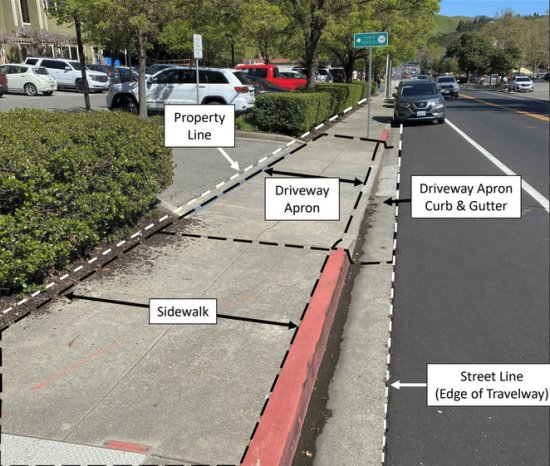
| ||||||
Since Moraga's incorporation in 1974, the cost sharing policy has gone through a variety of iterations. According to Public Works Director/Town Engineer Shawn Knapp's April 10 staff report, between November 1974 to September 1977, there was a continuation of Contra Costa County policy whereby private property owners were responsible for maintaining the sidewalk area; in 1977, a Town Curb and Gutter Committee gave a "no change" recommendation; between Aug. 27, 1977 to Sept. 7, 1977, there was a policy shift for the town to be responsible for maintenance of gutters and curbs when determined to be a public hazard and the responsible party was not identified; from 1977 to 1990, another policy shift allowed for "limited Town sidewalk area responsibility" whereby the town paid for the maintenance of gutters and curbs, unless they were damaged by others. Finally, via an adoption of Ordinance No.132 in 1990, policy shifted back to private property owners being responsible for maintaining the sidewalk area.
Knapp's report added that, between 1990 to 2012, the town's streets and infrastructure were continuing to deteriorate. In November 2012, voters approved of a local 1% Sales Tax Revenue Measure (Measure K), a general tax, to help improve and maintain the community's failing street network and other town needs; from 2013 to 2022, the town funded certain sidewalk area repairs that were part of street rehabilitation projects; between 2020 and 2022, there was additional clarification of private property owner sidewalk area maintenance and repair responsibilities. 2020 to 2024 saw the implementation of the "Worst First Residential Streets" approach, and with the Fiscal Year 2022-23, private property owners were held responsible for sidewalk area repairs that are part of street rehabilitation projects.
Staff began to identify $361,645 in necessary sidewalk repairs prior to beginning the 2022 Street Rehabilitation Project, and as such, provided each property owner with an option to either reimburse the town for repairs or hire their own contractor. By May 2023, the town entered into 116 reimbursement agreements with property owners which totaled $349,015. To date, only $132,100 has been collected, with another $12,630 in repair work having been funded and completed separately by each property owner.
As the Street Rehabilitation Project got underway, many property owners objected to the Cost Sharing Policy, and the town stopped collection of the remaining $216,915. Future street rehabilitation was put on hold while staff completed policy research.
Staff has recommended that the Municipal Code be amended to allow for use of public funding, which includes Measure K funds, to pay for those sidewalk repairs that would normally be the responsibility of property owners. The town would also reimburse those property owners who made repairs during FY 2022-23 (approximately $144,730), and enter into agreements with each property owner to make certain that any future maintenance and repairs would fall to property owners.
Town Manager Scott Mitnick's slide presentation during the Town Council's April 10 meeting explained that the benefits of the new resolution would "reduce staff time spent on Reimbursement Agreements (saving up to $150,000)", that there would be "more efficient use of staff time and increased focus on street projects" as well as an "increase in project implementation and decreased enforcement" that would promote a "positive relationship with property owners".
Mitnick pointed out additional benefits such as, "uniform high-quality sidewalk area repairs; safer sidewalks and increased ADA compliance; improved neighborhood connectivity, aesthetics, and property values; and property owners would retain maintenance repair and legal liability."
The downside, according to Mitnick, would be the "reduction of $309,000 to $359,000 for street projects; less funding for other CIP projects and/or services; potential risk to the town; and possible confusion regarding how other sidewalk area repairs are funded."
The town council agreed to adopt a resolution revising the Town of Moraga's Street Rehabilitation Cost Sharing Policy to allow for the use of the town's Measure K Sales Tax funds to pay for sidewalk area repairs which are part of town street rehabilitation projects, while retaining private property owner obligations set forth in the Moraga Municipal Code pertaining to the public ROW. They also introduced an ordinance amending the Moraga Municipal Code Title 12, Chapter 12.04, Sidewalks, to incorporate the Revised Street Rehabilitation Cost Sharing Policy and other conforming amendments.
Reach the reporter at:
